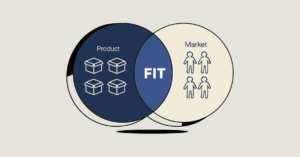Entrepreneurs have traditionally relied on venture capital as the primary source of funding. However, securing investment from venture capitalists was no easy task as investors were primarily driven by financial gain and demanded concrete results before investing.
The entrepreneurial landscape has evolved, and venture building is a new approach that offers a fresh perspective. This innovative model shifts the focus from just providing financial investment to actively creating, developing, and nurturing startups and their founders. Those engaged in venture building firmly believe that early-stage startups require more than just financial support – they require hands-on involvement, access to resources, and collaborative support.
Venture Builders and Venture Capitalists: A Symbiotic Relationship
In the world of entrepreneurship, venture builders and venture capitalists serve different yet complementary roles. While venture capitalists primarily act as financial investors, venture builders take a more comprehensive approach. They not only invest in the business but also provide a range of services to ensure its success. Venture builders work closely with supported businesses, offering daily operational insights, strategic development, service procurement, marketing, and other vital support services. By fostering a collaborative and nurturing environment, venture builders create a space where innovative ideas can thrive. Through their holistic approach, venture builders help take an idea to fruition by providing a strong support system for entrepreneurs.
Venture builders are proactive in leveraging their resources, experience, connections, and infrastructure to help new businesses thrive. What sets them apart from venture capitalists is their proactive stance, as venture capitalists often wait for concrete results before committing funds. Venture builders extend a comprehensive suite of benefits, encompassing industry expertise, market knowledge, operational proficiency, and support for securing financial investments. In contrast, the traditional VC model, focused primarily on results, may prioritize short-term gains over long-term growth strategies.
Within the startup ecosystem, collaboration between venture capitalists and venture builders emerges as a crucial dynamic with distinct priorities. Venture capitalists are primarily focused on maximizing return on investment (ROI), while venture builders prioritize speed of execution. Venture builders specialize in developing and launching minimum viable products (MVPs) quickly, and then refining them iteratively based on user feedback and market expectations. This approach enables them to stay agile and adapt their products to meet evolving market needs. On the other hand, venture capitalists are more focused on the financial aspects of the business, such as funding and valuation. However, despite these differences in priorities, the collaboration between venture builders and VCs can be highly beneficial for startups. By leveraging the expertise and resources of both parties, startups can benefit from a symbiotic relationship that drives growth and success within the ecosystem.
Venture Building: A Comprehensive Approach
Venture building is a complex process that involves various services aimed at creating and sustaining innovative startups. The process starts with identifying viable business ideas and models that have the potential for growth and profitability. Once a promising idea is identified, the next step is to assemble a cross-functional team with diverse skills and expertise to bring the idea to life.
Venture builders not only guide fundraising strategies and connect startups with potential investors to help raise capital, but they also invest in those startups themselves. Moreover, they offer support for managing the ventures through shared resources such as legal, finance, and marketing assistance.
The ultimate objective of fostering startups through the venture-building model is to ensure their long-term sustainability by providing ongoing support and resources. This includes developing a solid business plan, identifying and mitigating risks, and adapting to changing market conditions. Entrepreneurs, by embracing these fundamental principles, can collaborate with venture builders to transform innovative concepts into successful and sustainable businesses.
Success Stories of Venture Building
The venture-building approach has yielded remarkable successes, with notable companies emerging from this model. Rocket Internet stands as a quintessential example of successful venture building, particularly in its approach to identifying and replicating successful business models. This Berlin-based company has mastered the art of adapting proven ideas to new markets, as seen with Zalando, Europe’s leading online fashion retailer, inspired by the US’s Zappos. But Rocket Internet’s genius lies in more than replication; it excels in execution – from rapid team assembly to aggressive marketing. Consider Lazada in Southeast Asia, an e-commerce platform modeled after Amazon. Rocket Internet didn’t just clone the idea; they meticulously adapted it to fit the diverse markets of Southeast Asia, tweaking everything from product range to logistics and payment systems. This strategy led to significant success, culminating in Lazada’s acquisition by Alibaba. Rocket Internet’s story is not just about copying ideas but about swift execution, market adaptation, and robust operational strategies. Their approach, while sometimes controversial, offers a compelling case study of the power of execution speed and adaptability in the fast-paced tech startup world.
Antler, a global early-stage venture capital firm, presents a unique case study in the venture-building world. Unlike traditional models, Antler focuses on a talent-first approach, attracting individual entrepreneurs before they have formed teams or finalized ideas. This methodology was exemplified in their Singapore program, where they brought together diverse individuals from various backgrounds and provided a platform to develop their business ideas. One notable success story is Sampingan, an Indonesian gig economy platform. Initially conceptualized during an Antler program, Sampingan has since flourished, addressing the gap in the gig economy market by connecting businesses with an on-demand, verified workforce. Antler’s model stands out for its emphasis on fostering entrepreneurial talent and providing them with the tools, network, and capital to build successful companies from the ground up. This approach not only encourages innovation but also cultivates a new generation of entrepreneurs tailored to tackle contemporary market challenges. These case studies exemplify how venture building can pave the way for entrepreneurial success, offering startups and their founders the resources and support they need to thrive.
Dinare Ventures: Pioneering Venture Building in MENA
Dinare Ventures is committed to supporting the thriving MENA startup ecosystem. Our mission is to encourage innovation and promote sustainable businesses in the region. We believe in the power of venture building to empower entrepreneurs and provide essential resources to overcome the challenges of launching a new business.
Our aim is to collaborate seamlessly with global venture capitalists, leveraging our venture-building approach to create innovative and sustainable businesses. Our experienced staff and experts work together to achieve this goal, bringing their extensive knowledge of building successful ventures in the region. This collaborative endeavor not only benefits individual entrepreneurs but also enriches the broader ecosystem, paving the way for sustained growth and success. Join our community today to be a part of this dynamic journey towards entrepreneurial excellence. Visit our website and become a valued member of the Dinare Ventures community.




